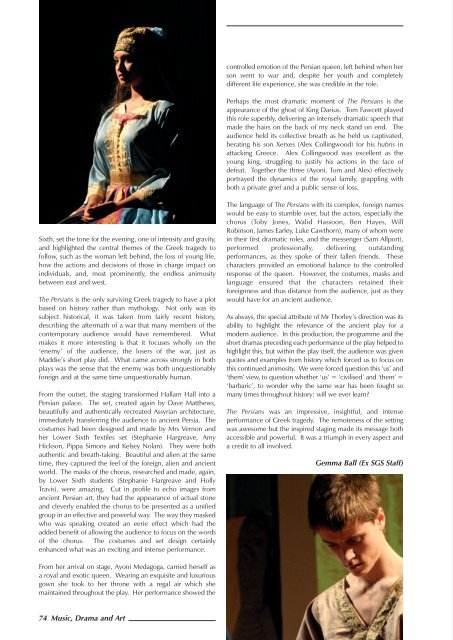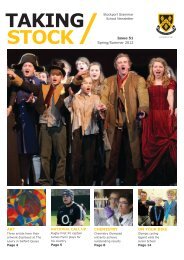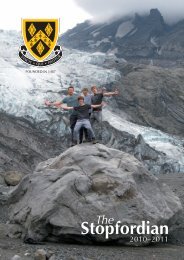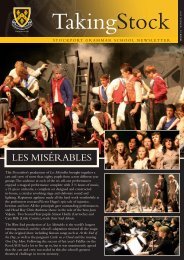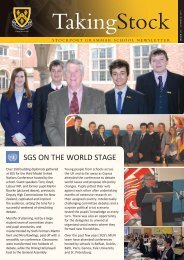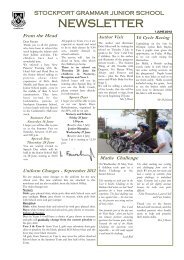Download the 2011-2012 Stopfordian (pdf) - Stockport Grammar ...
Download the 2011-2012 Stopfordian (pdf) - Stockport Grammar ...
Download the 2011-2012 Stopfordian (pdf) - Stockport Grammar ...
Create successful ePaper yourself
Turn your PDF publications into a flip-book with our unique Google optimized e-Paper software.
controlled emotion of <strong>the</strong> Persian queen, left behind when her<br />
son went to war and, despite her youth and completely<br />
different life experience, she was credible in <strong>the</strong> role.<br />
Perhaps <strong>the</strong> most dramatic moment of The Persians is <strong>the</strong><br />
appearance of <strong>the</strong> ghost of King Darius. Tom Fawcett played<br />
this role superbly, delivering an intensely dramatic speech that<br />
made <strong>the</strong> hairs on <strong>the</strong> back of my neck stand on end. The<br />
audience held its collective breath as he held us captivated,<br />
berating his son Xerxes (Alex Collingwood) for his hubris in<br />
attacking Greece. Alex Collingwood was excellent as <strong>the</strong><br />
young king, struggling to justify his actions in <strong>the</strong> face of<br />
defeat. Toge<strong>the</strong>r <strong>the</strong> three (Ayoni, Tom and Alex) effectively<br />
portrayed <strong>the</strong> dynamics of <strong>the</strong> royal family, grappling with<br />
both a private grief and a public sense of loss.<br />
Sixth, set <strong>the</strong> tone for <strong>the</strong> evening, one of intensity and gravity,<br />
and highlighted <strong>the</strong> central <strong>the</strong>mes of <strong>the</strong> Greek tragedy to<br />
follow, such as <strong>the</strong> woman left behind, <strong>the</strong> loss of young life,<br />
how <strong>the</strong> actions and decisions of those in charge impact on<br />
individuals, and, most prominently, <strong>the</strong> endless animosity<br />
between east and west.<br />
The Persians is <strong>the</strong> only surviving Greek tragedy to have a plot<br />
based on history ra<strong>the</strong>r than mythology. Not only was its<br />
subject historical, it was taken from fairly recent history,<br />
describing <strong>the</strong> aftermath of a war that many members of <strong>the</strong><br />
contemporary audience would have remembered. What<br />
makes it more interesting is that it focuses wholly on <strong>the</strong><br />
‘enemy’ of <strong>the</strong> audience, <strong>the</strong> losers of <strong>the</strong> war, just as<br />
Maddie’s short play did. What came across strongly in both<br />
plays was <strong>the</strong> sense that <strong>the</strong> enemy was both unquestionably<br />
foreign and at <strong>the</strong> same time unquestionably human.<br />
From <strong>the</strong> outset, <strong>the</strong> staging transformed Hallam Hall into a<br />
Persian palace. The set, created again by Dave Mat<strong>the</strong>ws,<br />
beautifully and au<strong>the</strong>ntically recreated Assyrian architecture,<br />
immediately transferring <strong>the</strong> audience to ancient Persia. The<br />
costumes had been designed and made by Mrs Vernon and<br />
her Lower Sixth Textiles set (Stephanie Hargreave, Amy<br />
Hickson, Pippa Simons and Kelsey Nolan). They were both<br />
au<strong>the</strong>ntic and breath-taking. Beautiful and alien at <strong>the</strong> same<br />
time, <strong>the</strong>y captured <strong>the</strong> feel of <strong>the</strong> foreign, alien and ancient<br />
world. The masks of <strong>the</strong> chorus, researched and made, again,<br />
by Lower Sixth students (Stephanie Hargreave and Holly<br />
Travis), were amazing. Cut in profile to echo images from<br />
ancient Persian art, <strong>the</strong>y had <strong>the</strong> appearance of actual stone<br />
and cleverly enabled <strong>the</strong> chorus to be presented as a unified<br />
group in an effective and powerful way. The way <strong>the</strong>y masked<br />
who was speaking created an eerie effect which had <strong>the</strong><br />
added benefit of allowing <strong>the</strong> audience to focus on <strong>the</strong> words<br />
of <strong>the</strong> chorus. The costumes and set design certainly<br />
enhanced what was an exciting and intense performance.<br />
The language of The Persians with its complex, foreign names<br />
would be easy to stumble over, but <strong>the</strong> actors, especially <strong>the</strong><br />
chorus (Toby Jones, Walid Hassoon, Ben Hayes, Will<br />
Robinson, James Earley, Luke Cawthorn), many of whom were<br />
in <strong>the</strong>ir first dramatic roles, and <strong>the</strong> messenger (Sam Allport),<br />
performed professionally, delivering outstanding<br />
performances, as <strong>the</strong>y spoke of <strong>the</strong>ir fallen friends. These<br />
characters provided an emotional balance to <strong>the</strong> controlled<br />
response of <strong>the</strong> queen. However, <strong>the</strong> costumes, masks and<br />
language ensured that <strong>the</strong> characters retained <strong>the</strong>ir<br />
foreignness and thus distance from <strong>the</strong> audience, just as <strong>the</strong>y<br />
would have for an ancient audience.<br />
As always, <strong>the</strong> special attribute of Mr Thorley’s direction was its<br />
ability to highlight <strong>the</strong> relevance of <strong>the</strong> ancient play for a<br />
modern audience. In this production, <strong>the</strong> programme and <strong>the</strong><br />
short dramas preceding each performance of <strong>the</strong> play helped to<br />
highlight this, but within <strong>the</strong> play itself, <strong>the</strong> audience was given<br />
quotes and examples from history which forced us to focus on<br />
this continued animosity. We were forced question this ‘us’ and<br />
‘<strong>the</strong>m’ view, to question whe<strong>the</strong>r ‘us’ = ‘civilised’ and ‘<strong>the</strong>m’ =<br />
‘barbaric’, to wonder why <strong>the</strong> same war has been fought so<br />
many times throughout history: will we ever learn?<br />
The Persians was an impressive, insightful, and intense<br />
performance of Greek tragedy. The remoteness of <strong>the</strong> setting<br />
was awesome but <strong>the</strong> inspired staging made its message both<br />
accessible and powerful. It was a triumph in every aspect and<br />
a credit to all involved.<br />
Gemma Ball (Ex SGS Staff)<br />
From her arrival on stage, Ayoni Medagoga, carried herself as<br />
a royal and exotic queen. Wearing an exquisite and luxurious<br />
gown she took to her throne with a regal air which she<br />
maintained throughout <strong>the</strong> play. Her performance showed <strong>the</strong><br />
74 Music, Drama and Art


